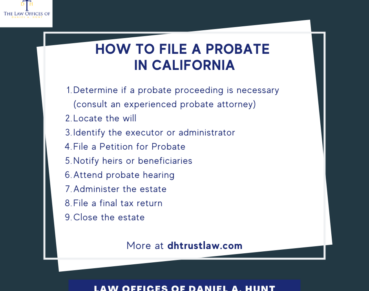How Do I Sell Real Estate During the California Probate Process?
In Sacramento, the probate process involves transferring property from an estate to a person who passed away to the beneficiaries. The executor of the estate may need to sell real estate during probate. Executors have the authority to sell real estate to pay off the estate’s debts as long as the deceased individual did not give the real estate to a beneficiary.
Making a Valid Real Estate Sale During the Probate Process
What happens after a California estate executor sells a piece of real estate owned by the estate? The California probate court in charge of handling your estate will split the proceeds from the sale of the real estate among the beneficiaries. Estate executors have a legal duty to follow strict sales procedures in order to make a valid sale of the real estate.
1) Appraise the Real Estate That You Wish to Sell
The first step in selling real estate that is in probate is to appraise the property you wish to sell. Be sure to use an independent, certified appraiser. At the Law Office of Daniel Hunt, we can help you find an appraiser who meets the requirements set forth in California probate law.
2) Seek and Obtain a Petition to Sell Real Estate from the Probate Court
The next step is to petition the probate court to sell real estate. Fill out the petition thoroughly and make sure that you include all of the relevant information that pertains to the property sale. You will need to state whether you plan to sell the real estate in an open market sale or through a real estate auction. When you file the petition to sell real estate, you will need to submit the independent appraisal. Next, you will await the approval of the probate court. Once you receive approval, you can proceed with the real estate sale.
3) Place the Property Up for Sale
The next step is to put the property up for sale in an auction, or through a real estate agent on the open market. Make sure that you list the real estate at a fair price. You do not want the price to be too low or too high that it would raise suspicions among the beneficiaries. Inform any potential serious buyers of the real estate that the acceptance of their offer is conditional on the court’s confirmation.
4) Petition the Probate Court for a Hearing Confirming the Sale
After you accept an offer from a buyer, you will need to petition the probate court for a hearing to confirm the sale of the real estate. The wait before the hearing varies, depending on the current load of that particular court’s calendar. Most hearings happen within 20 to 40 days of the Executor filing a petition.
5) Arrange for a Deposit
You will need to secure a deposit from the buyer of 10% of the purchase price. Make sure that you secure the deposit before the scheduled date of the court hearing.
6) Advertise the Sale
Advertise the sale of the real estate along with the price that the buyer offered with a local newspaper. This advertisement will inform the public of the sale of real estate. This will allow open bidding at the court hearing among any interested parties. The purpose of the real estate sale is to secure the best possible price for the real estate. The open bidding process helps you gain the best price for the real estate.
7) Attend the Probate Court Hearing
You will need to attend the court hearing and wait for the bidding process to go forward. Bids proceed in increments of $500 above the offer from the intended original buyer’s offer. The buyer of the real estate must be allowed to bid, as well. All of the bids are unconditional. The winner of the bidding must present a cashier’s check to the probate court for a deposit on the real estate after confirming the bid.
8) Refund the Deposit When Necessary
If a new buyer outbids the original buyer, you will need to refund the deposit to the original buyer. If the original buyer succeeded throughout the bidding process, you will need to deduct the amount of the deposit from the overall purchase price.
9) Complete the Sale of the Real Estate
You will need to close the real estate contract by completing the sale. Be sure that the financing is enough to cover the property cost and that the full amount of the sale of the property will go into the estate fund.
Selling Real Estate Without Court Approval
It is possible to sell real estate during the probate process without getting court approval. The Independent Administration of Estates Act allows Executors to sell real estate owned by the estate as long as they notify all beneficiaries at least 15 days before the real estate sale. As long as there are no objections from the beneficiaries, the sale can proceed.
The Importance of Hiring an Estate Lawyer
If you have been appointed as the Executor of an estate, you owe the beneficiaries a serious legal duty, called a fiduciary duty. If you breach that duty, even unintentionally, you can face serious penalties and fines. We encourage estate Executors to reach out to an experienced Sacramento estate lawyer as soon as possible before selling any property in the estate.
At the Law Offices of Daniel Hunt, we can advise you as to your duties and responsibilities as an Executor. We can also help you make sure that any real estate sales during the probate process meet the extensive requirements set forth under California law. Contact the experienced estate planning lawyers at the Law Offices of Daniel Hunt to schedule your initial consultation today.
Law Offices of Daniel A. Hunt
The Law Offices of Daniel A. Hunt is a California law firm specializing in Estate Planning; Trust Administration & Litigation; Probate; and Conservatorships. We've helped over 10,000 clients find peace of mind. We serve clients throughout the greater Sacramento region and the state of California.




